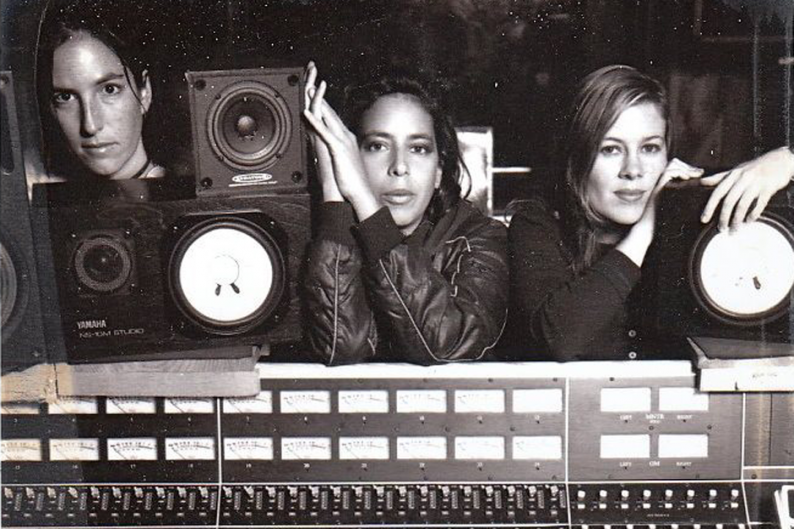Luscious Jackson emerged in 1991 as the coolest girls strutting the East Village. Playing a mélange of hip-hop rhythms, brooding bass, and mysterious harmonies, the group — founding members Jill Cunniff, Gabby Glaser, and Kate Schellenbach — hit hard among the then-burgeoning alt-punk-hip-hop scene in New York, propped up by their lifelong friends the Beastie Boys. By the time 1997 rolled around, Luscious Jackson had hit the Billboard charts (“Naked Eye”), and solidified themselves as one of the era’s most unique bands. But when their final album, Electric Honey, failed to pop off — and Cunniff wanted to have children — they went on hiatus in 2000.
But after 12 years, the trio is working on a new album, beginning with the breakbeat-laden pop song “Are You Ready?” Now liberated by the Internet, the group is funding their new work entirely through their fans via Pledge Drive, and gearing up for a new tour schedule (working around their families, of course). “Our fans are basically supporting our new record,” says Glaser. “It’s amazing.”
SPIN spent a sunny March afternoon at Cunniff’s home studio in South Brooklyn, where we heard awesome new forthcoming songs (the sound hasn’t changed a bit, yet still sounds fresh and relevant) and chatted about resurrecting their ahead-of-their-time style, how the industry has changed, and why being 15 in 1980s Manhattan was the best.
So you’re a bicoastal band now. How does that work?
Jill Cunniff: Kate, our drummer, lives in LA, she works for the Kathy Griffin show. We pitched a song for her show, but they didn’t use it, so we’re trying to make it into a song. We miss having her in the room, and we talk to her a lot. We’re looking forward to getting together and playing out. It’s been so long.
When was the last time you all played together?
Gabby Glaser: 2000, in Florida, opening for Smash Mouth. We did a Yahoo! tour with Smash Mouth.
That is so Y2K.
JC: That’s why it’s gonna be so fun to actually get back together and see our fans and play. We have a lot of offers, but we have to see how expensive it all has become. Back then, there was one way to do it, at least in our experience: make your album, and go on tour, and each thing took like a year. But everything is totally different now and people want music constantly.
GG: It’s very hard to plan exactly what we’re doing, it’s a whole different game now. Throw up a song, and radio stations can play it the day after. Which is what happened to us.
Did you ever feel like you were pressured by your old label?
JC: The Beastie Boys ran our label, Mike D specifically, so with him being a musician, there was no discussion. We just did exactly what we wanted. There was definitely like, “you need singles,” you cannot avoid that. But the marketing people had been record store owners, and just very music-oriented, that’s why they were in the business. They saw their job as preserving the music. It was definitely a nice vibe.
Tell me about your musical vision for this album.
GG: None of us have ever really stopped making music. We’ve both put out records.
JC: We always blended everything. Our musical vision was based on our life growing up in New York, and experiencing incredible amounts of music from the age of 13. I don’t think that’s happening for people that much anymore, but we were all out at clubs from like 13 on. That’s where we met, we met the Beasties, we had a crew of like 15-year-olds and we’d just roll in the city from club to club, and all the door people knew us so they’d just let us in. So it was an extraordinary kind of ‘80s musical education. I think our vision grew out of that, which was like, try to absorb and put together as many musical genres as we can to make our own thing. That included hip-hop, really that incredible hip-hop era, graffiti and hip-hop explosion of the early ‘80s, and sort of like this end of the punk New York scene, beginning of hardcore. We didn’t really get into hardcore but we experienced the Bad Brains, that was the main group we all went to see.
GG: I feel like every 16-year-old should go see them.
JC: It was so incredible to be like, hanging out with those guys and going to see them every weekend practically, and absorbing that intense musical experience. And that’s the rock side of what we do, we always want to have that fast, intense side in our set. And for me, I listen to a lot of melodic folk stuff. I spent a lot of time listening to folk females. GG: I’m an intense Neil Young, Bob Dylan fan. But the girl stuff was more you.
JC: It’s very ironic because we were kind of ahead, people were like, people don’t understand that you’re mixing all these genres. I felt lucky that we did have a fanbase but I think people perceived us as possibly having a cap, like oh, the mainstream will never understand.
GG: Certainly we had a problem with the radio stations, with genres.
How did that work?
JC: We were on “Alternative” a lot, that was our genre. Then what happened with our last album, it was ironic: Lilith Fair had created all these radio stations that were female-centric, and before that, we’d been Alternative Rock stations with like No Doubt, and Hole, and Garbage. Those were the female artists on Alternative. After Lilith, there were all these stations created for women’s music, and the Alternative stations cleared out the women. So by the time our last album came out, it was rough: they couldn’t get the song on the radio, except for all these feminine stations. And that was the death knell for our last album. I felt it, I was like oh shit, we’re not gonna be able to get this record to where it needs to be.
GG: It’s a crapshoot. You could have a really good record, but it won’t see the light of day.
JC: I remember them pulling the plug on it at Capitol. He was like, “Oh… we’re not gonna put out your next single.” They sent us all these alarm clocks! It was really sucky! We all received gifts of those CD alarm clocks, and I was like… nice. Like, you’re done. It was like a consolation prize. We killed ourselves on that last album, it was a real labor of love, and I love it. But you can’t predict when this stuff is gonna happen. I remember feeling really bummed.
It’s insane to think about Lilith, something that was meant to uplift women, actually helped create more gender segregation.
JC: Sometimes that’s what happens. You don’t know what’s gonna happen with these cultural moments. And people get sick of it. One year it brought everybody up. Two years later, it just separated everything. Now, I don’t even pay attention to what’s mainstream anymore, because it’s bananas. In a way it’s good, the fragmentation of the global world. I always felt like we were a band that was so multi-genre that I feel like we fit in now. People might appreciate it now, like oh, I get this, you guys have a hip-hop beat, rock guitar, and harmony vocals. Cool.
Going back and listening to your music, I realized how poppy it is!
GG: That’s Jill’s melodies: her love of Jackson 5. “Are You Ready?” is really, really pop, but we didn’t intend it to be that way.
JC: I am grateful because it allowed us to have hit songs. We wouldn’t have gotten on the radio without that: it has to have a hook.
How did you write “Are You Ready?”
JC: We started with the breakbeat here, and just layered it up. We wanted to bring in our old influences: breakbeats, that early hip-hop sound. Kate brought in her 808 programming stuff that was really cool, so it was a layered process. I felt like writing an inspirational song, because people are struggling right now, financially, and I wanted to write something that would be uplifting, get people moving and dancing and having fun. It’s a little bit about getting the band back together too.
So, one of your rewards on your Pledge Drive is that you’ll take people on a walking tour of Manhattan. Where are you gonna take them?
GG: Oh, definitely Lower East Side. We’ll show them all the clubs, you know, take em out for pizza like Joey Ramone would.
JC: If the person is a Beasties fan, there’s a hair salon now where Beasties used to rehearse. I’ve actually gone and gotten my hair done there just because I had to. There’s a video of us all there doing one of their early, early songs. A Super 8 movie. “Egg Raid on Mojo.” Like, here’s where the Beasties used to practice. Here’s some hair.
GG: We used to sit on stoops and harass people, so we could do a little of that. Nicely! Like if someone walked by wearing a bright red jacket we’d go, “Oh my God, that jacket’s so niiiiiice, right?”





